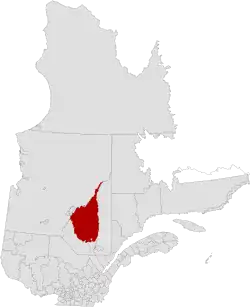Maria-Chapdelaine Regional County Municipality
Maria-Chapdelaine is a regional county municipality in the Saguenay–Lac-Saint-Jean region of Quebec, Canada. Its seat is in Dolbeau-Mistassini.
Maria-Chapdelaine | |
|---|---|
 | |
| Coordinates: 48°59′N 72°17′W[1] | |
| Country | |
| Province | |
| Region | Saguenay–Lac-Saint-Jean |
| Effective | January 1, 1983 |
| County seat | Dolbeau-Mistassini |
| Government | |
| • Type | Prefecture |
| • Prefect | Luc Simard |
| Area | |
| • Total | 38,056.70 km2 (14,693.77 sq mi) |
| • Land | 36,768.21 km2 (14,196.29 sq mi) |
| Population (2021)[4] | |
| • Total | 24,149 |
| • Density | 0.7/km2 (2/sq mi) |
| • Change (2016-2021) | |
| • Dwellings | 12,185 |
| Time zone | UTC−5 (EST) |
| • Summer (DST) | UTC−4 (EDT) |
| Area code(s) | 418 and 581 |
| Website | www |
| [5] | |
It runs from Lac Saint-Jean in the south to the deep interior of northern Quebec in the north.
Subdivisions
There are 14 subdivisions within the RCM:[2]
|
|
|
|
|
Transportation
Demographics
In the 2021 Census of Population conducted by Statistics Canada, the RCM of Maria-Chapdelaine had a population of 24,149 living in 10,967 of its 12,185 total private dwellings, a change of -2.6% from its 2016 population of 24,793. With a land area of 35,501.49 km2 (13,707.20 sq mi), it had a population density of 0.7/km2 (1.8/sq mi) in 2021.[7]
In 2021, the median age was 50.0, as opposed to 41.6 for all of Canada. French was the mother tongue of 99.0% of residents in 2021. The next most common mother tongues were the related languages of Atikamekw and Innu at 0.3% total, followed by English and Spanish at 0.3% each. 0.3% reported both English and French as their first language. Additionally there were 0.1% who reported both French and a non-official language as their mother tongue.
As of 2021, Indigenous peoples comprised 6.8% of the population, and visible minorities contributed 1.1%. The largest visible minority groups in the RCM of Maria-Chapdelaine are Black (0.5%), Arab (0.2%), and Latin American (0.2%).
In 2021, 79.1% of the population identified as Catholic, while 13.6% said they had no religious affiliation. Jehovah's Witnesses were the largest religious minority, making up 0.6% of the population. Muslims were the largest non-Christian religious minority, making up just over 0.1% of the population.
Counting both single and multiple responses, the most commonly identified ethnocultural ancestries were:
| Ethnic origin | 2021 |
|---|---|
| Canadian | 42.1% |
| French | 21.0% |
| Québécois | 15.4% |
| French Canadian | 9.4% |
| First Nations | 4.2% |
| Métis | 2.7% |
| Irish | 1.6% |
| Innu | 1.2% |
| Acadian | 1.0% |
(Percentages may total more than 100% due to rounding and multiple responses).
References
- "Reference number 141059 in Banque de noms de lieux du Québec". toponymie.gouv.qc.ca (in French). Commission de toponymie du Québec.
- "Ministère des Affaires municipales, des Régions et de l'Occupation du territoire: Maria-Chapdelaine Regional County Municipality". Archived from the original on 2016-02-27. Retrieved 2012-03-11.
- "Census Profile, 2016 Census Maria-Chapdelaine, Municipalité régionale de comté [Census division], Quebec". Statistics Canada. 8 February 2017. Retrieved December 14, 2019.
- "Census Profile, 2032 Census Maria-Chapdelaine, Municipalité régionale de comté [Census division], Quebec". Statistics Canada. Retrieved December 12, 2022.
- 2011 Statistics Canada Census Profile: Maria-Chapdelaine Regional County Municipality, Quebec
- Official Transport Quebec Road Map
- "Population and dwelling counts: Canada, provinces and territories, and census subdivisions (municipalities), Quebec". Statistics Canada. February 9, 2022. Retrieved August 29, 2022.